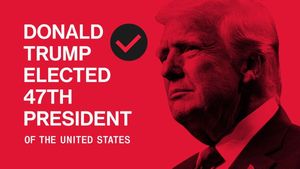Donald Trump appears headed toward another run for the presidency, as the 2024 Election rapidly approaches. His campaign strategy is already stirring up controversy, leading many to question whether he will repeat past mistakes or forge a new path. From inflammatory speeches to policy contradictions, each public appearance is shaping the narrative for his potential candidacy.
Last week, Trump took to the stage at the first presidential debate, where he faced off against Vice President Kamala Harris. While many expected him to address pressing issues directly—like the economy—his responses often strayed off topic. Trump engaged in some curious claims, one being about migrants supposedly coming to America only to eat pets, which left many debate followers scratching their heads. Harris, on her end, attempted to counter Trump’s wild claims with facts, driving home her point about the importance of thoughtful legislation rather than reckless rhetoric.
At the heart of Trump’s debate performance—and seemingly his campaign overall—lies the politically charged issue of abortion rights. The former president faced criticism for failing to clarify his stance on the potential for banning abortion nationwide. Rather than stating he would veto any federal abortion ban, Trump seemed to evade the question repeatedly. This hesitation brought forth serious concerns about his actual intent on the matter, especially as the political climate grows increasingly polarized.
Trump's silence on a federal abortion ban contrasts sharply with his previous actions and statements. His administration's record reveals his intent to erode women’s reproductive rights, including opposing Planned Parenthood and nominating many conservative judges who might restrict these rights. Just months ago, he hinted at supporting national restrictions on abortion, claiming he was leaning toward endorsing a 15-week national ban.
Polling indicates significant backlash against the Republican Party's current stance on abortion, especially among female voters. Trump’s campaign appears to acknowledge this dissatisfaction, as evidenced by targeted mailings and local campaigns proclaiming he wouldn’t support stringent abortion measures. His running mate, Senator J.D. Vance of Ohio, also engaged vocal support against federal abortion policies but later expressed regret over his comments, admitting to his failures to definitively advocate for Trump's views.
This marks only the beginning of the hurdles Trump faces. His campaign can’t afford to overlook voter sensibilities surrounding the topic of reproductive rights. Yet, judging by recent missteps, it might be headed for trouble. The current administration has seen some degree of success addressing voter concerns over abortion rights, apparent during campaign events where speakers like Hadley Duvall, who experienced personal trauma linked to abortion restrictions, hogged the spotlight. Harris, at these events, emphasized the importance of choice and access to healthcare, framing herself as the candidate who understands the emotional and physical challenges women face when healthcare becomes politicized.
But it’s not just abortion rights Trump must contend with; the economy is shaping up to be another flashpoint issue. Recently, Trump proposed tariffs on foreign imports to bring down grocery prices—a suggestion met with skepticism. Analysts argue these tariffs may backfire, likely causing grocery prices to climb rather than decrease. Instead of focusing on feasible economic reforms, Trump’s sweeping proclamations have often led to widespread confusion.
With each passing day, the criticism of his debate performance and campaign strategies continues to gain momentum. Trump's remarks on various topics occasionally drift toward the bizarre. Whether it’s mischaracterizing immigrant behavior or disregarding the actual failures of his past policies, many are left wondering if this haphazard discussion is indicative of the overall campaign approach he plans to take.
Notably, as the election gears up, the presence of controversial candidates like North Carolina's Lt. Governor Mark Robinson raises concerns about election strategy and integrity. Robinson’s candidacy has been marred by questionable comments and stances on sensitive topics. Critics within the GOP are already worried his presence could drag down the overall ticket, particularly as Trump has historically backed candidates who align with his divisive strategy, seeking to energize his base rather than broaden his appeal.
Compounding these challenges, Robinson faces allegations about his past comments made on various forums, which could put substantial pressure on him to withdraw from the gubernatorial race. If the Republican Party wants to maintain chances for success, they'll likely need to distance themselves from such candidates as the election date looms closer. Trump’s lasting influence over his party means these dynamics will potentially affect how candidates like Robinson resonate with the broader electorate. If even one or two voters associate undesirable candidates directly with Trump, the backlash could be significant.
Shifting to the issue of immigration, Trump’s campaign rhetoric has remained consistently inflammatory, emphasizing phrases aimed at galvanizing support among his base rather than presenting constructive policy. Such tactics may energize some, but they simultaneously alienate substantial voter demographics, particularly moderates and independent voters. This election season, Trump’s past comments about immigration often evoke memories of his initial run for office, where similar language raised eyebrows and accusations of xenophobia erupted.
The recent swing state conversations have high stakes, and it’s worth noting these states are considered pivots for Trump’s route to victory. Trump’s campaign is predominantly focused on winning over voters from key demographics—particularly those who may feel neglected or betrayed by establishment politics. If current strategies fall flat, the risk of voter apathy could become increasingly dire for Trump’s ambitions.
Finally, as the election equips the spotlight on Trump, it prods issues of accountability among GOP candidates. While infighting and coalition building are part of the game, Trump's insistence on courting those entrenched within his political philosophies signifies potential fractures within the party itself. For 2024 elections, it might just culminate as the test of Trump’s true influence over GOP policies and candidate selection.
Trump heads toward the future, but the questions surrounding his credibility, accountability, and approach to pivoting debates are yet unresolved. Only time will tell whether the former president can shift gears effectively—and if he can, whether it will be enough to seal his comeback. Backed by unwavering support among his base but facing growing scrutiny from moderates, the pathway to the Oval Office remains charged and filled with potential contention.



